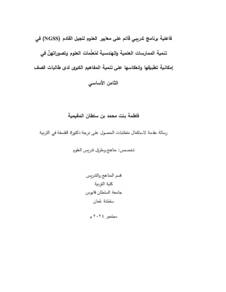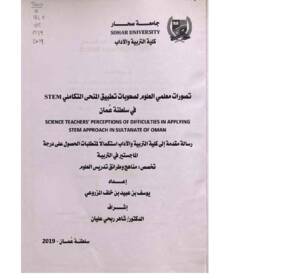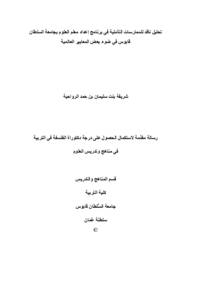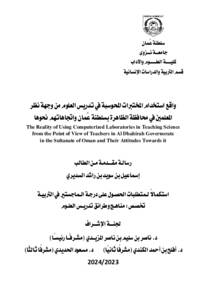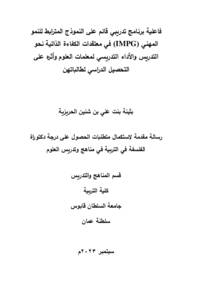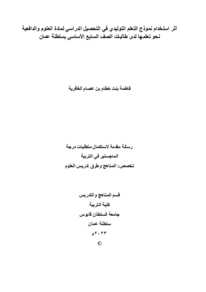Document
فاعلية برنامج تدريبي قائم على معايير العلوم للجيل القادم (NGSS) في تنمية الممارسات العلمية والهندسية لمعلمات العلوم وتصوراتهن في إمكانية تطبيقها وإنعكاسها على تنمية المفاهيم الكبرى لدى طالبات الصف الثامن الأساسي.
Source
رسالة دكتوراة
Other titles
The Effectiveness of a training program based on next generation science standards (NGSS) in developing scientific and engineering practices of science teachers and their perceptions of its applicability and their reflection on the development of crosscut
Country
عمان
City
مسقط
Publisher
جامعة السلطان قابوس
Gregorian
2024
Language
Arabic
Thesis Type
رسالة دكتوراة
English abstract
The current study aimed to design a training program based on the Next
Generation Science Standards (NGSS) to investigate its effectiveness in
developing the scientific and engineering practices of eighth-grade science
teachers, their perceptions of the applicability of these practices, and the impact
on the development of crosscutting concepts among female students in the
eighth grade. To achieve its objectives and answer its questions, the current
study used a mixed method by applying an explanatory sequential design. The
design used a quasi-experimental design with two groups. The study sample
consisted of two groups: the female science teachers’ category, which included
(28) female teachers, who were divided into two groups: experimental, which
consisted of (14) female teachers, and a control group, which consisted of (14)
female teachers. The female student’s category included (860) female students,
and this category was divided into two groups: an experimental group
consisting of (413) female students taught by the teachers of the experimental
group, and a control group consisting of (447) female students taught by the
teachers of the control group.
To achieve the objectives of the study, the researcher prepared
educational material represented in a training program based on the NGSS
standards along with four tools that were prepared for the current study: A
scientific and engineering practices observation card, and a questionnaire
measuring the perceptions of science teachers of the applicability of these
practices as it was designed based on the theory of planned behavior. A focus
group interview card for teachers, the questions of which were designed from
the questionnaire statements, and a test measuring the crosscutting concepts in
science for female students. The researcher extracted validity and reliability
indicators of these tools were extracted using appropriate methods and found to
be acceptable for the purposes of the current study
To answer the study questions and test the hypotheses related to them,
the independent sample t-test, multiple analysis of variance (MANOVA), and
multiple associated analysis of variance (MANCOVA) were used. The results
showed that there were statistically significant differences in favor of the group
parameters. Experimental group teachers in all eight scientific and engineering
practices, and a moderate positive intention in their perceptions of these
teachers towards the application of these practices, where the reaching an
average of (1.97). The results showed that there were statistically significant
differences in favor of the female student teachers of the experimental group in
the crosscutting concepts test in the post-application attributed to the training
program.
In light of these results, this current study presented several
recommendations, the most important of which are: Adopting the training
program guide based on the Next Generation Science Standards (NGSS),
including the knowledge, skills, and steps to apply these standards in
sustainable professional development programs for science teachers, whether
centralized or decentralized. It also drew the attention of officials and
curriculum designers to the necessity of including the dimensions of the Next
Generation Science Standards (NGSS) in the curricula. The current study also
suggested conducting further studies to investigate the effectiveness of training
programs based on Next Generation Science Standards (NGSS) on other
variables related to the teachers and students.
Arabic abstract
هدفت الدراسة الحالية إلى تصميم برنامج تدريبي مبني على معايير الجيل القادم للعلوم (NGSS) للتحقق من فاعليته في تنمية الممارسات العلمية والهندسية لدى معلمات العلوم في الصف الثامن، وتصوراتهن لإمكانية تطبيق هذه الممارسات، وأثر ذلك على تنمية المفاهيم الكبرى المشتركة لدى طالباتهن في الصف الثامن الأساسي. ولتحقيق أهدافها والإجابة على أسئلتها، استخدمت الدراسة الحالية المنهج المزجي من خلال تطبيق التصميم المتسلسل التفسيري. واستخدم التصميم شبه التجريبي بمجموعتين. تكونت عينة الدراسة من مجموعتين: فئة معلمات العلوم، والتي ضمت (28) معلمة، تم تقسيمهن إلى مجموعتين: تجريبية، وتكونت من 14 معلمة وضابطة، وتكونت من (14) معلمة. وقد شملت فئة الطالبات (860) طالبة، وقد تم تقسيم هذه الفئة إلى مجموعتين: مجموعة تجريبية تكونت من (413) طالبة تدرسهن معلمات المجموعة التجريبية، ومجموعة ضابطة تكونت من (447) طالبة تدرسهن معلمات المجموعة الضابطة. ولتحقيق أهداف الدراسة أعدت الباحثة المادة التعليمية المتمثلة في برنامج تدريبي مبني على معايير الجيل القادم للعلوم، بالإضافة إلى أربع أدوات تم إعدادها للدراسة الحالية وهي: بطاقة ملاحظة الممارسات العلمية والهندسية، واستبانة قياس تصورات معلمات العلوم لإمكانية تطبيق هذه الممارسات حيث تم تصميمها بناءً على نظرية السلوك المخطط، وبطاقة مقابلات مجموعة التركيز للمعلمات، والتي تم تصميم أسئلتها من عبارات الاستبانة، واختبار قياس المفاهيم الكبرى المشتركة في العلوم للطالبات. واستخرجت الباحثة دلالات الصدق والثبات لهذه الأدوات باستخدام الأساليب المناسبة ووجد أنها مقبولة لأغراض الدراسة الحالية.
وللإجابة على أسئلة الدراسة واختبار الفرضيات المتعلقة بها تم استخدام اختبار (ت) للعينات المستقلة وتحليل التباين المتعدد (MANOVA) وتحليل التباين المتعدد المرتبط (MANCOVA) وأظهرت النتائج وجود فروق ذات دلالة إحصائية لصالح معلمات المجموعة التجريبية في جميع الممارسات العلمية والهندسية الثمانية، ووجود نية إيجابية متوسطة في تصوراتهن لهؤلاء المعلمين نحو تطبيق هذه الممارسات حيث بلغ متوسطها (1.97). وأظهرت النتائج وجود فروق ذات دلالة إحصائية لصالح معلمات المجموعة التجريبية في اختبار المفاهيم المتقاطعة في التطبيق البعدي تعزى للبرنامج التدريبي.
وفي ضوء هذه النتائج قدمت الدراسة الحالية عدة توصيات من أهمها: اعتماد دليل برامج التدريب المبني على معايير الجيل القادم للعلوم (NGSS) بما في ذلك المعارف والمهارات والخطوات اللازمة لتطبيق هذه المعايير في برامج التنمية المهنية المستدامة لمعلمي العلوم سواء كانت مركزية أو لامركزية. كما لفتت انتباه المسئولين ومصممي المناهج إلى ضرورة تضمين أبعاد معايير الجيل القادم للعلوم (NGSS) في المناهج. كما اقترحت الدراسة الحالية إجراء المزيد من الدراسات للتحقق من فاعلية برامج التدريب المبني على معايير الجيل القادم للعلوم (NGSS) على متغيرات أخرى مرتبطة بالمعلم والطالب.
وللإجابة على أسئلة الدراسة واختبار الفرضيات المتعلقة بها تم استخدام اختبار (ت) للعينات المستقلة وتحليل التباين المتعدد (MANOVA) وتحليل التباين المتعدد المرتبط (MANCOVA) وأظهرت النتائج وجود فروق ذات دلالة إحصائية لصالح معلمات المجموعة التجريبية في جميع الممارسات العلمية والهندسية الثمانية، ووجود نية إيجابية متوسطة في تصوراتهن لهؤلاء المعلمين نحو تطبيق هذه الممارسات حيث بلغ متوسطها (1.97). وأظهرت النتائج وجود فروق ذات دلالة إحصائية لصالح معلمات المجموعة التجريبية في اختبار المفاهيم المتقاطعة في التطبيق البعدي تعزى للبرنامج التدريبي.
وفي ضوء هذه النتائج قدمت الدراسة الحالية عدة توصيات من أهمها: اعتماد دليل برامج التدريب المبني على معايير الجيل القادم للعلوم (NGSS) بما في ذلك المعارف والمهارات والخطوات اللازمة لتطبيق هذه المعايير في برامج التنمية المهنية المستدامة لمعلمي العلوم سواء كانت مركزية أو لامركزية. كما لفتت انتباه المسئولين ومصممي المناهج إلى ضرورة تضمين أبعاد معايير الجيل القادم للعلوم (NGSS) في المناهج. كما اقترحت الدراسة الحالية إجراء المزيد من الدراسات للتحقق من فاعلية برامج التدريب المبني على معايير الجيل القادم للعلوم (NGSS) على متغيرات أخرى مرتبطة بالمعلم والطالب.
Category
Theses and Dissertations

